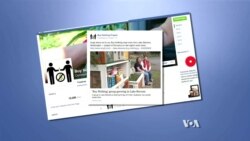For Liesl Clark, the inspiration for what would become the Buy Nothing Project came during a trip to Nepal. “We spent a lot of time living in villages with local people who really care for each other,” she said of her time working overseas.
“They live in modern-day gift economies that certainly have gone for centuries. These are cash-free, cashless cultures. There are no stores in the villages and so they’re sharing communal resources. After having seen this over and over again, my friend Rebecca Rockefeller and I started asking, is this something that we could do in our own hometown?”
Some of the infrastructure for the project was already in place. Recycling has become pretty routine in communities around the U.S. so the idea of reusing cans, bottles, old newspapers, all kinds of things was part of the local ethos. Extending that idea to everything from unwanted clothes and toys to books and services was a simple jump.
Add the power of the Internet and some inspired grassroots organizations willing to set up local networks, and suddenly a community can reuse all sorts of items.
In these 'gift economies,' neighbors advertise things they don't want, and ask for what they'd like to have, and donors and recipients are brought together.
Give freely, share creatively
Clark and Rockefeller's network is called the Buy Nothing Project. Its mission: help people clear out clutter, save money, reduce waste and create connected communities.
The two friends started a Facebook page for their first Buy Nothing group on Bainbridge Island, near Seattle, Washington, in 2013. There are now 580 groups.
“We’re in 12 nations," Clark said. "We have over 100,000 members. I’d say it’s approaching 110,000 members worldwide, and a volunteer network of about 750 volunteers from all over the world.”
One of those volunteers is Kristi Guidry, who set up a Buy Nothing group in the Washington suburb of Reston, Virginia, three months ago. It already has more than 200 members.
From Facebook to face-to-face
Both “gifters” and “giftees” meet on Facebook to post the items they’re offering or ask for what they’re looking for. When there's a match, they get together to pass along the item. Guidry says the idea is to pool resources and reuse items before buying something new.
“[It's] everything you can imagine, really," Guidry said. “We‘ve got people that are giving items: book, cookware and furniture. My husband has been looking for computer parts so he can build computers on his own." Other members offer what Guidry calls 'gifts of self:' "their time and personal services, things like helping people clean, babysitting, go out to lunch just for company. So really people just make a post on our Facebook page. We operate everything through our Facebook page.”
The concept fits Maggie Terry's lifestyle and ideals.
“I work for an environmental organization and what’s important to me is the idea that things don’t end up in a landfill,” she explained. ”So I was really excited to think that the things that I’m keeping just because I didn’t want to throw away not because I need them still could go to somebody who really would need them and get enjoyment out of them.”
Kim Lysik Di Santi joined Buy Nothing Reston a few weeks ago, after she heard about it from a friend, and the idea appealed to her, "because I’ve been for a while wanting to watch my purchase decisions because of the fact that things get cluttery in the house.”
Guidry says the mission of the Buy Nothing movement offers a life lesson for her children. “I’m really trying to encourage them to kind of let go of things because things don’t necessarily matter what does matter is the connection that you have with other people.”
That sense of community is an added benefit of the local gift economy.






